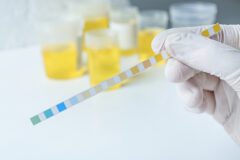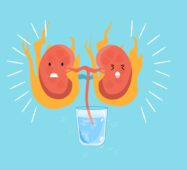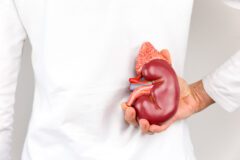 Urea is a nitrogenous chemical substance which is formed from the liver via the metabolic breakdown with aminoacids, what are the foundations of healthy proteins. It is then moved throughout the blood vessels to the renal system, where it’s filtered and then passed in the form of the urine. Even though the major use of urea would be to clear away nitrogenous waste products from the body, additionally, it possesses other necessary functions in maintaining your body’s all-around health. One of several crucial functions of urea is to try to manage the human body’s water balance. It can this through raising the volume of urea in the circulation, which pulls water out from the cells and tissues and then into the bloodstream. This procedure helps you to maintain your system’s fluid balance, that is needed for appropriate hydration along with the correct functioning of numerous internal organs and systems in your body. The urea in addition plays a vital role in the process of protein functionality, that is the process by which your body makes proteins. As aminoacids are separated to create urea, a lot of the byproducts are utilized to create new proteins. This technique is crucial for sustaining […] read more
Urea is a nitrogenous chemical substance which is formed from the liver via the metabolic breakdown with aminoacids, what are the foundations of healthy proteins. It is then moved throughout the blood vessels to the renal system, where it’s filtered and then passed in the form of the urine. Even though the major use of urea would be to clear away nitrogenous waste products from the body, additionally, it possesses other necessary functions in maintaining your body’s all-around health. One of several crucial functions of urea is to try to manage the human body’s water balance. It can this through raising the volume of urea in the circulation, which pulls water out from the cells and tissues and then into the bloodstream. This procedure helps you to maintain your system’s fluid balance, that is needed for appropriate hydration along with the correct functioning of numerous internal organs and systems in your body. The urea in addition plays a vital role in the process of protein functionality, that is the process by which your body makes proteins. As aminoacids are separated to create urea, a lot of the byproducts are utilized to create new proteins. This technique is crucial for sustaining […] read more
Last Updated:
June 4, 2025
What does the body do with urea?
 Urea is a nitrogenous chemical substance which is formed from the liver via the metabolic breakdown with aminoacids, what are the foundations of healthy proteins. It is then moved throughout the blood vessels to the renal system, where it’s filtered and then passed in the form of the urine. Even though the major use of urea would be to clear away nitrogenous waste products from the body, additionally, it possesses other necessary functions in maintaining your body’s all-around health. One of several crucial functions of urea is to try to manage the human body’s water balance. It can this through raising the volume of urea in the circulation, which pulls water out from the cells and tissues and then into the bloodstream. This procedure helps you to maintain your system’s fluid balance, that is needed for appropriate hydration along with the correct functioning of numerous internal organs and systems in your body. The urea in addition plays a vital role in the process of protein functionality, that is the process by which your body makes proteins. As aminoacids are separated to create urea, a lot of the byproducts are utilized to create new proteins. This technique is crucial for sustaining […] read more
Urea is a nitrogenous chemical substance which is formed from the liver via the metabolic breakdown with aminoacids, what are the foundations of healthy proteins. It is then moved throughout the blood vessels to the renal system, where it’s filtered and then passed in the form of the urine. Even though the major use of urea would be to clear away nitrogenous waste products from the body, additionally, it possesses other necessary functions in maintaining your body’s all-around health. One of several crucial functions of urea is to try to manage the human body’s water balance. It can this through raising the volume of urea in the circulation, which pulls water out from the cells and tissues and then into the bloodstream. This procedure helps you to maintain your system’s fluid balance, that is needed for appropriate hydration along with the correct functioning of numerous internal organs and systems in your body. The urea in addition plays a vital role in the process of protein functionality, that is the process by which your body makes proteins. As aminoacids are separated to create urea, a lot of the byproducts are utilized to create new proteins. This technique is crucial for sustaining […] read more
What is kidney dialysis used for?
 Kidney (renal) dialysis is a medical procedure currently in use to treat those that have kidney (renal) failure, often known as end-stage renal disease (ESRD). Your kidneys are a set of vital organs that handle filtering waste and also excessive body fluids from the blood, in addition to sustaining the balance of important nutrients and hormones in the body. When the kidneys aren’t able to perform these kinds of functions effectively, waste materials as well as fluids accumulate within the body, ultimately causing really serious medical problems. Kidney dialysis is really a life saving therapy that artificially takes on the roles of the kidneys, eliminating waste materials in addition to extra fluids from the body. The procedure is done by filtering the blood by using a machine called a dialysis machine, that contains a semi-permeable membrane layer that separates waste materials and excess body fluids from the blood. The filtered blood will be taken back to the body. There’s two main kinds of kidney dialysis: hemodialysis and peritoneal dialysis. Hemodialysis is among the most frequent type of dialysis that necessitates the use of a dialysis machine as well as an manufactured kidney, called an artificial kidney dialysis device. The patient’s […] read more
Kidney (renal) dialysis is a medical procedure currently in use to treat those that have kidney (renal) failure, often known as end-stage renal disease (ESRD). Your kidneys are a set of vital organs that handle filtering waste and also excessive body fluids from the blood, in addition to sustaining the balance of important nutrients and hormones in the body. When the kidneys aren’t able to perform these kinds of functions effectively, waste materials as well as fluids accumulate within the body, ultimately causing really serious medical problems. Kidney dialysis is really a life saving therapy that artificially takes on the roles of the kidneys, eliminating waste materials in addition to extra fluids from the body. The procedure is done by filtering the blood by using a machine called a dialysis machine, that contains a semi-permeable membrane layer that separates waste materials and excess body fluids from the blood. The filtered blood will be taken back to the body. There’s two main kinds of kidney dialysis: hemodialysis and peritoneal dialysis. Hemodialysis is among the most frequent type of dialysis that necessitates the use of a dialysis machine as well as an manufactured kidney, called an artificial kidney dialysis device. The patient’s […] read more
What is the difference between acute and chronic kidney disease?
 Chronic kidney disease (CKD) and acute kidney disease (AKD) are two different types of kidney problems that have distinct causes, symptoms, and treatments. Chronic kidney disease is a long-term, progressive loss of kidney function over a period of months or years. This type of kidney disease is usually caused by a number of factors such as diabetes, high blood pressure, and glomerulonephritis. Symptoms of CKD may not appear until the disease is in an advanced stage and can include fatigue, nausea, itching, and fluid buildup. Treatment for CKD typically involves controlling underlying causes, managing symptoms, and reducing further damage to the kidneys. In some cases, dialysis or kidney transplantation may be necessary. Acute kidney disease, on the other hand, is a sudden and often temporary loss of kidney function that can occur as a result of injury, infection, or other factors that cause damage to the kidneys. AKD usually develops over a matter of days or weeks and can cause symptoms such as decreased urine output, swelling, and muscle cramps. Treatment for AKD typically involves addressing the underlying cause, such as treating an infection or correcting a medication issue, and may involve hospitalization. In severe cases, dialysis may be necessary. […] read more
Chronic kidney disease (CKD) and acute kidney disease (AKD) are two different types of kidney problems that have distinct causes, symptoms, and treatments. Chronic kidney disease is a long-term, progressive loss of kidney function over a period of months or years. This type of kidney disease is usually caused by a number of factors such as diabetes, high blood pressure, and glomerulonephritis. Symptoms of CKD may not appear until the disease is in an advanced stage and can include fatigue, nausea, itching, and fluid buildup. Treatment for CKD typically involves controlling underlying causes, managing symptoms, and reducing further damage to the kidneys. In some cases, dialysis or kidney transplantation may be necessary. Acute kidney disease, on the other hand, is a sudden and often temporary loss of kidney function that can occur as a result of injury, infection, or other factors that cause damage to the kidneys. AKD usually develops over a matter of days or weeks and can cause symptoms such as decreased urine output, swelling, and muscle cramps. Treatment for AKD typically involves addressing the underlying cause, such as treating an infection or correcting a medication issue, and may involve hospitalization. In severe cases, dialysis may be necessary. […] read more